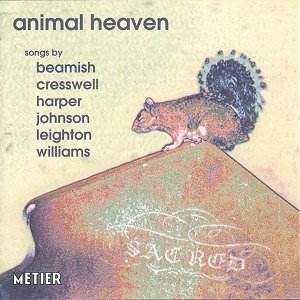The Metier label continues to provide a fine service
to little heard British music and this is yet another enterprising release
coupling well-known names with the less familiar. The works have strong
links with the performers featured here (certainly the Leighton, Beamish,
Williams and Johnson were premiered by Alison Wells, John Turner and
his ensemble) whilst the Harper was written in memory of Leighton and
David Johnsonís work in response to the premiere of Leightonís Animal
Heaven.
There is still shamefully little of Kenneth Leightonís
orchestral and chamber music available on disc (surely an opportunity
for a progressive label here!) although it is pleasing to see that gradually
his choral music in particular is receiving attention. This performance
of Animal Heaven is therefore most welcome and certainly for
this listener, the highlight of the disc. In the form of a diptych,
the two songs set poetry by Walt Whitman (taken from Song of
Myself) and the contemporary writer (also American) James Dickey.
It is a typically thoughtful work with an equally typical underlying
spirituality, dealing with the "innocence of animals and their
place in creation (a theme that David Johnson explores in a very different
way in his work, God, Man and the Animals). Both songs feature
long instrumental introductions, the first predominantly contemplative
in nature until a sudden change of tempo transforms the mood, the second
almost dance like in character again preceded by a slow introduction
and revisiting material from the first song as it approaches its conclusion.
The quality and originality of Leightonís melodic and harmonic invention
is evident from the very opening bars and the performances do the music
justice in every way.
Edward Harperís Lights Out is the most immediately
serious work on the disc, Edward Thomasí deeply felt and intensely personal
war inspired poetry prompting an equally deeply felt response from the
composer. The outer two songs, The Trumpet and Lights Out,
are both responses to the regular trumpet calls, which Thomas heard
at Trowbridge Barracks although each of these songs receives very different
treatment by Harper. The opening call to attention cleverly exploits
simple arpeggios in the voice (based on the harmonics of the trumpet
call "Reveille") set against a variety of instrumental textures
and harmonic contrasts, whilst Lights Out is a contemplative
and moving passacaglia, a profound conclusion to the cycle. Between
these, The Ash Grove is a fantasy on the folk tune of the same
name, the well-known tune making itself heard at the end of the song
on the recorder. By contrast The Windís Song transforms itself
following an introspective opening, into a breathless sound picture
of the wind "blowing the pine boughs among".
Despite their brevity I was very much taken with Sally
Beamishís Four Findrinny Songs, each of them a tiny golden nugget
of inspiration (appropriate perhaps as Beamish tells us that Findrinny
is an alloy of silver and gold). Scored for soprano and recorder, the
longest of these songs (Grey Seal) comes in at only 2:23 yet
each has something to say, speaking in a characteristically directly
manner. The words are by a Scottish poet, Donald Goodbrand Saunders,
with whom Beamish has since collaborated again, and the music is heavily
imbued with, as the composer puts it, "Scottish overtones",
including a highly effective imitation of the sound of a Grey Seal on
recorder!
The remaining works by Lyell Cresswell, Roger Williams
and David Johnson are perhaps less memorable in their originality than
the other works presented although all are well written and deserve
to be heard. New Zealand born Cresswellís brief yet haunting Prayer
to appease the Spirit of the Land is based on a Maori prayer and
forms a tribute to the memory of the soprano Tracey Chadwell. Edward
Learís verse needs no introduction and Roger Williamsí fleeting settings
of three of his limericks coupled with an anonymous Scottish lullaby
are both amusing and effective. David Johnson wrote God, Man and
the Animals as a present for John Turner and his ensemble following
their premiere of Leightonís Animal Heaven, the work being based
on the Grimm fairy- tale Die Lebensdauer, a tongue in cheek,
yet darkly moralistic tale of manís greedy request for eternal life
during Godís creation of the animal world. Johnson makes good use of
the scope for characterisation given by the tale, creating a kind of
opera for one singer and weaving an imaginative instrumental accompaniment
to the sopranoís somewhat anglicised text.
All of these works are given strong, highly committed
performances by John Turner and his ensemble, with Alison Wells being
worthy of particular praise for her confident vocal delivery. The recording
is well focused and natural. I very much hope that Metier and the same
artists have more in store for us in the future.
Christopher Thomas
See also review by Hubert
Culot

![]() Alison Wells soprano, John
Turner recorder, Keith Elcombe harpsichord, Jonathan Price cello.
Alison Wells soprano, John
Turner recorder, Keith Elcombe harpsichord, Jonathan Price cello. ![]() METIER MSV CD92036
DDD [61:32]
METIER MSV CD92036
DDD [61:32]